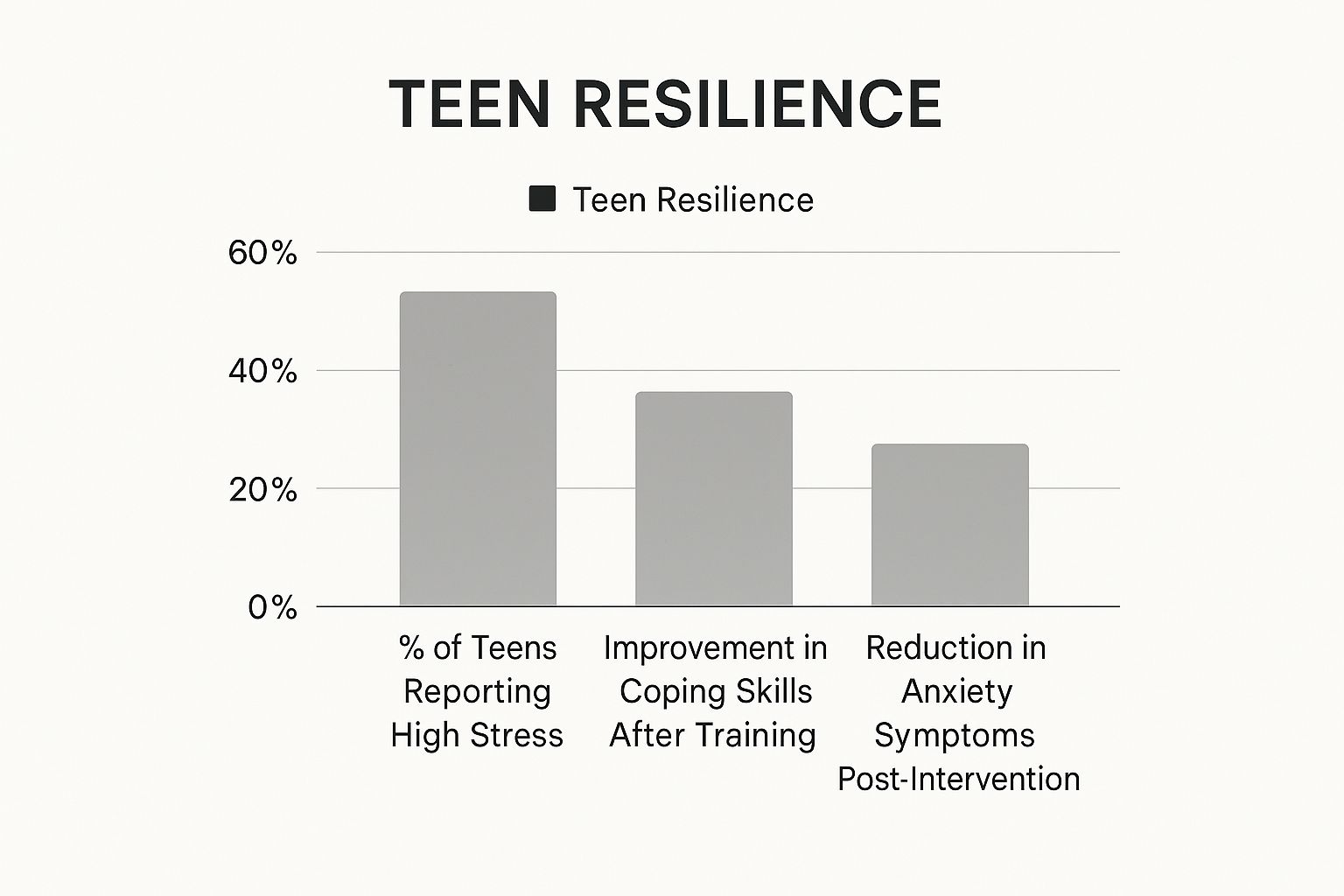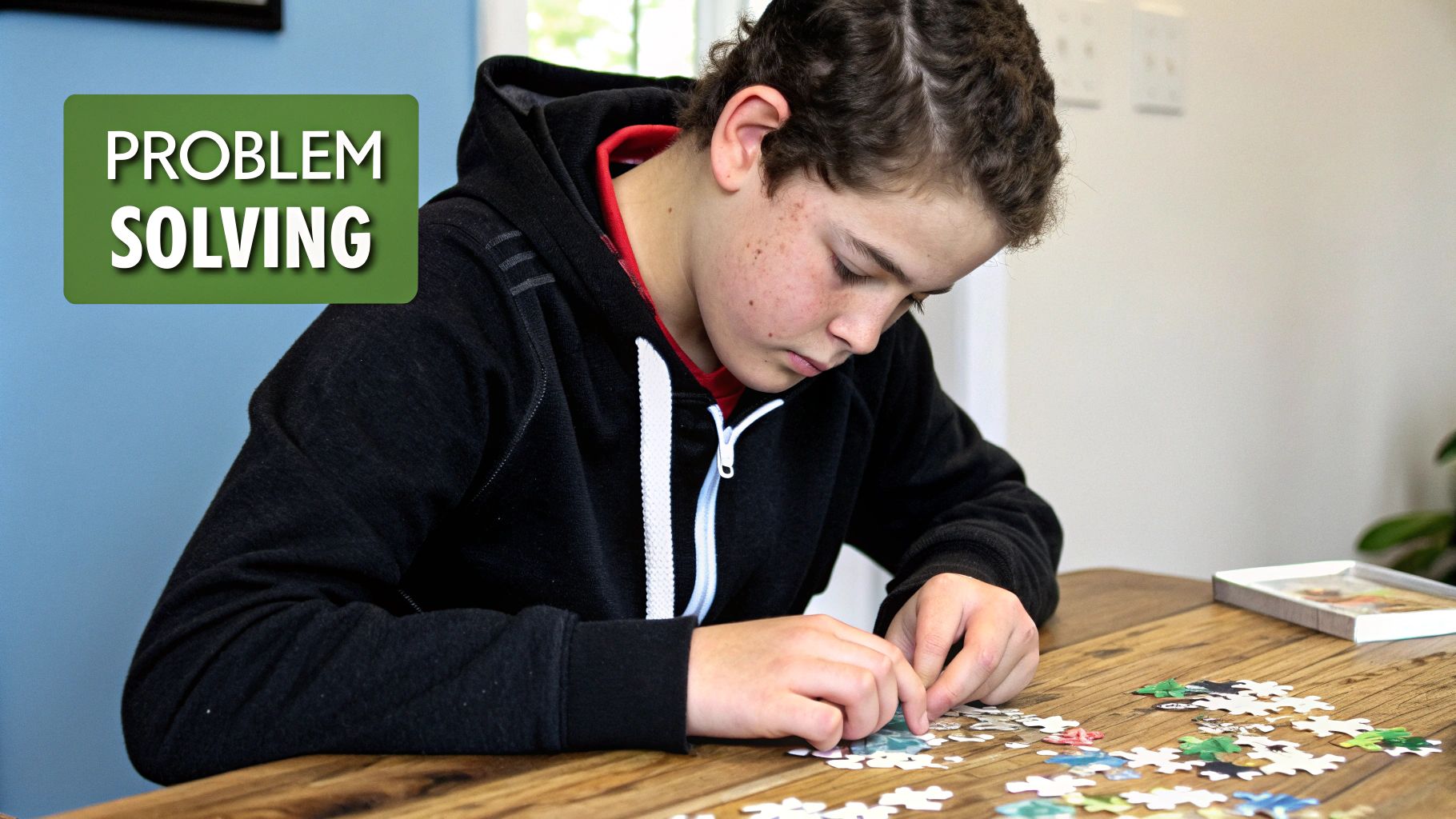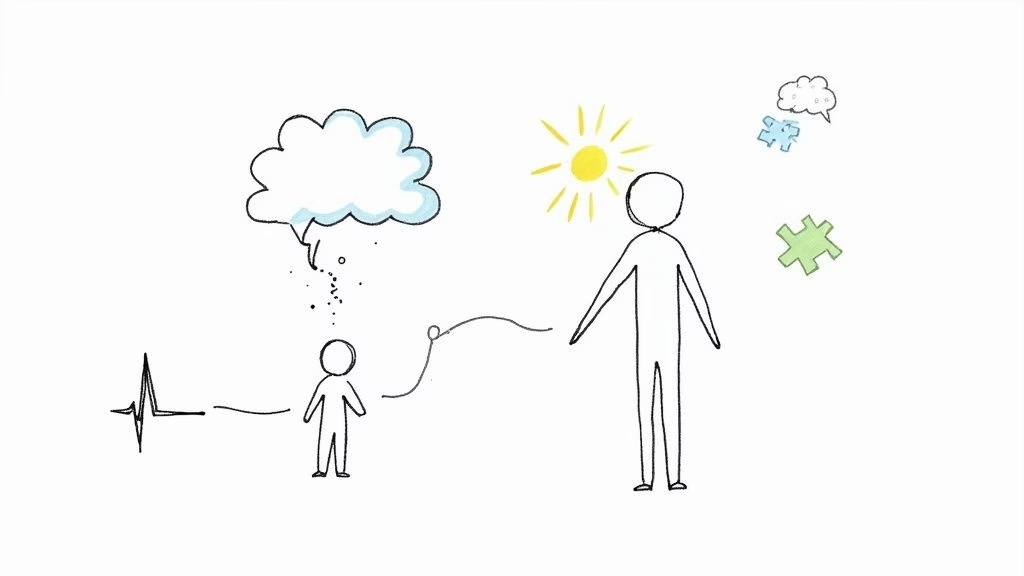Let's be honest—parenting a teenager today feels like navigating a whole new world. The pressures they face are relentless, from the constant buzz of social media to academic expectations that seem to grow heavier each year. It’s not just that life feels harder; for many teens, it genuinely is.
Building resilience isn't about raising a kid who never struggles. It’s about raising one who knows how to struggle well. It's about giving them the tools to manage stress, bounce back from setbacks, and face life with confidence instead of fear. Think of it as a fundamental life skill, essential for thriving, not just surviving, the turbulent teen years.
The Rising Tide of Teen Stress
When your teen procrastinates on homework or seems completely unmotivated, it's easy to jump to conclusions about laziness. But more often than not, what looks like apathy is actually a symptom of something deeper—anxiety, overwhelm, or a paralyzing fear of failure. When every test feels like it will make or break their future and social status is literally quantified by likes, it's no wonder they feel like they're drowning.
This isn’t just a feeling; the numbers back it up. According to data from respected health organizations like the CDC and WHO, an alarming 40% of high school students report persistent feelings of sadness or hopelessness. This statistic is a wake-up call. It highlights an urgent need to build resilience and help them manage these profound emotional challenges. You can explore more on this trend and its impact on teen mental health.
A resilient teen isn’t one who is shielded from stress, but one who has been given the tools and support to face it. They learn that setbacks are temporary and that they have the inner strength to get back up.
The chart below shows just how much of a difference the right support can make.

While stress is clearly a major issue, the data also shows that with the right strategies, teens can and do learn to cope more effectively. There's real hope here.
To help make this concrete, let's break down the core components that form the foundation of resilience. These pillars are what we're aiming to build, piece by piece, as we guide our teens.
The Core Pillars of Teen Resilience
A quick summary of the key components that help your teen bounce back from challenges and thrive.
| Pillar | What It Means for Your Teen |
|---|---|
| Emotional Awareness | Recognizing and naming their feelings without judgment. Not "I'm bad," but "I feel anxious." |
| Problem-Solving | The ability to brainstorm solutions instead of getting stuck in the problem. |
| Healthy Connections | Knowing who their support system is—family, friends, mentors—and feeling safe enough to reach out. |
| Sense of Purpose | Having something that gives them meaning, whether it's a hobby, a goal, or helping others. |
| Optimism | Believing that things can get better and that they have some control over their future. |
| Self-Compassion | Treating themselves with the same kindness they'd offer a friend when they make a mistake. |
These pillars don't appear overnight. They are built through small, consistent actions and conversations, creating a sturdy foundation that will support them long after they've left home.
What A Resilient Teen Looks Like
So, what does this actually look like in real life? A resilient teen isn't a robot who ignores problems or pretends they don't feel hurt. Instead, you'll start to see small but powerful shifts in their behavior.
- They see failure as feedback, not a final verdict. Instead of shutting down after a bad grade, they might say, “Okay, that study method didn’t work. What can I try next time?”
- They know who to turn to. When they're struggling, they have a go-to person—a parent, a friend, a coach—they can trust for support.
- They become problem-solvers. When faced with a dilemma, they start brainstorming what to do next instead of freezing in panic or just hoping it goes away.
Building resilience is a journey of a thousand small steps. It all starts with really seeing and understanding their world. Once we do that, we can start giving them the practical, actionable strategies they need to build their own strength.
Creating a Home Base of Connection and Safety

Let’s be honest: your connection with your teen is the single most powerful buffer they have against stress. Friends are crucial, and so are their activities, but nothing replaces the feeling of having a safe harbor at home. It’s the bedrock for building resilience in teens.
This connection gives them the confidence to take risks and face challenges, knowing they have a non-judgmental place to land if they stumble. And it’s not about being a perfect parent—it's about being a present one.
This foundation is built in the small, consistent moments. The quick check-in after school, a shared laugh over a silly video, or just listening without jumping in to fix everything. These tiny interactions send a huge signal: you are seen, you are heard, and you are loved unconditionally.
From Procrastination to Conversation
When you see your teen putting off schoolwork or seeming completely unmotivated, the first instinct for many of us is to lecture or lay down the law. But more often than not, this behavior isn't about laziness. It's rooted in anxiety or a feeling of being completely overwhelmed.
So, instead of adding more pressure, use it as an opening to connect.
Rather than hitting them with, "Why haven't you started your homework yet?" try a softer, more open-ended approach. Something as simple as, "You seem pretty stressed about that history project. What's on your mind?" can open the door to a real conversation about what's actually going on. You instantly shift the dynamic from a confrontation to a collaboration.
When a teen feels truly heard, their defensive walls start to come down. Validating their feelings—even if you don’t agree with their choices—shows respect and builds trust. Saying, "It sounds like you're feeling completely overwhelmed by this," is worlds more effective than, "You just need to get started."
Practical Parenting Tips for Real Connection
Fostering this bond takes intentional effort, especially when teens are in that natural phase of pulling away and finding their own independence. Here are a few parenting tips I've seen work wonders:
- Practice Active Listening: This means putting your phone away, turning to face them, and actually listening. A great trick is to reflect back what you hear—"So, it sounds like you’re frustrated with your friend because…"—to show you're paying attention and to make sure you're getting it right.
- Validate First, Solve Later: When your teen shares a problem, fight that urge to immediately jump in with solutions. Your first job is to be an emotional ally. Let them feel what they're feeling without judgment. Often, just being heard is all they need to start figuring out the solution on their own.
- Share Your Own Struggles (Appropriately): You don't need to unload all your adult problems on them, but mentioning a time you felt overwhelmed at work or made a mistake can normalize their experience. It shows them that setbacks are just a part of life for everyone, not a sign of personal failure.
A strong parent-child bond is directly tied to a teen's sense of self-worth. If you want to dive deeper, you can learn more by checking out our guide on improving https://andrewpetrillolifecoaching.com/self-esteem-in-teenager/, which offers even more strategies for building their confidence from the ground up.
Building this foundation takes time and a whole lot of patience, especially if trust has been shaky. But remember, every small moment of connection is a deposit in their emotional bank account, creating a reserve of strength they can draw on when life inevitably gets tough.
Helping Your Teen Navigate the Digital World

Let's be honest, social media isn't just a place for teens to kill time. It's a huge part of their world, shaping their mental health in ways we're only beginning to understand. This is where building resilience in teens becomes absolutely critical. The constant flood of perfectly curated lives can crank up anxiety and social comparison, making it incredibly tough for them to feel good about their own reality.
Trying to ban technology altogether is a losing battle. The real goal is to give your teen the tools to use it with intention and awareness. This goes way beyond setting screen time limits. It’s about having real, ongoing conversations about the digital spaces they live in.
The stakes are higher than we might think. Research paints a pretty clear picture of the link between problematic social media use and mental health struggles. A study across 44 countries found that this kind of use among 11- to 15-year-olds jumped from 7% in 2018 to 11% in 2022. This isn't just a number; it correlates with a rise in suicide attempts and points to a digital dependency that can eat away at a teen's resilience. You can read more about the global impact of this trend.
Fostering Digital Resilience
To push back against these pressures, we have to help our teens become sharp, critical thinkers online. This is all about teaching them to question what they see, to recognize how algorithms are designed to influence their emotions, and to get that online personas are just one slice of the story.
You can start by sparking their curiosity instead of delivering a lecture. Try a question like, "I saw that post. How do you think seeing something like that makes other people feel?" Or, "What do you think is really going on behind the camera in that 'perfect' vacation photo?" This simple shift changes your role from enforcer to a fellow navigator, exploring this world alongside them.
A key part of digital resilience is helping your teen understand the difference between the 'highlight reel' they see online and the complex, messy reality of everyone's actual life. This awareness is a powerful defense against feelings of inadequacy and comparison.
Creating a Family Tech Plan Together
Here’s a truth I’ve learned from experience: sitting down and creating a family tech plan with your teen is worlds more effective than just laying down the law. When they have a say in the boundaries, they’re far more likely to buy in and respect them. The process itself is a fantastic lesson in self-regulation and motivation.
Here are a few parenting tips to get you started:
- Establish "No-Tech" Zones and Times: Don’t frame it as a punishment. Make it a shared family agreement to be more present. Work together to decide which areas (like the dinner table or bedrooms) and which times (like an hour before bed) should be screen-free.
- Discuss Cyberbullying Openly: Don't wait until there’s a crisis. Talk about what cyberbullying actually looks like and the importance of being an "upstander"—the person who supports the target. Most importantly, make it crystal clear they can come to you for help without the fear of having their phone taken away.
- Model Healthy Habits: This is the big one. If you're scrolling through dinner or glued to your notifications while you talk to them, your words about balance will mean nothing. Show them what responsible, mindful tech use looks like. Your actions speak louder than any rule you can set.
Tackling School Procrastination and Boosting Motivation

It’s a familiar scene: your teen is staring at a blank screen, hours ticking by, and the school assignment is going nowhere. It’s so easy to label this as laziness. But I've learned, both personally and as a coach, that procrastination is rarely about a lack of effort.
More often than not, it's a symptom of something deeper. It’s a response to feeling completely overwhelmed, anxious about not being perfect, or just plain disconnected from the work. Adding pressure with nagging or threats? That just fuels the anxiety and makes the shutdown even worse.
The real key to building resilience in teens is to switch your approach. Stop being the enforcer and start being a collaborator. Get curious about why they're avoiding the task. Is the project just too big? Are they terrified of a bad grade? Do they have any idea where to even start? Figuring out the "why" is the only way to find a solution that actually works.
This isn’t just about getting homework done. It's about helping them build crucial executive function skills—the ability to plan, organize, and follow through. You're teaching them how to work, not just demanding that they do it.
From Pressure to Partnership
Shifting from nagging to collaborating starts with changing your words. Instead of, "Why aren't you done yet?" try something like, "That project seems like a lot. What’s the first small piece we could figure out together?" You’re reframing the task from an impossible mountain into a series of small, manageable hills.
This is where having a growth mindset is a game-changer. It’s the core belief that intelligence and skills aren’t fixed—they can be developed with effort and smart strategies. So, instead of praising talent ("You're so smart"), praise their process ("I love how you broke that down"). This reinforces that their actions and strategies are what truly matter, not just the final grade.
A teen's motivation is often tied to a sense of autonomy and purpose. When they feel in control and can see the relevance of their work, their internal drive kicks in. The goal is to help them find that personal connection, even in subjects they don't love.
Actionable Strategies to Boost Motivation
Here are a few practical parenting tips you can use to help your teen beat procrastination and tap into their own drive. These aren’t quick fixes; they’re skill-building strategies.
- Break It Down: Large assignments are paralyzing. Sit with your teen and break them down into tiny, concrete steps. "Work on your history essay" becomes "Find three credible sources." The next step might just be "Write the topic sentence for the first paragraph." Each small win creates momentum.
- Focus on the Process, Not Just the Grade: Take the pressure off the final score. Shift your conversations toward the learning journey itself. Ask things like, "What was the most interesting thing you found while researching this?" or "What's a different strategy you could try on the next test?" This lowers the fear of failure and makes it safer to try.
- Connect Schoolwork to Their Interests: Help them find a personal hook. If they're into video games, you can talk about character development in The Great Gatsby. If they care about social justice, connect that passion to a historical event. These links can ignite a spark of genuine curiosity that makes the work feel less like a chore.
If you want to dig deeper into the psychology behind this common struggle, you can find more specific techniques on how to stop procrastinating. By fostering a growth mindset and giving them the right kind of support, you empower them to face challenges with real confidence and resilience.
Building Confidence Through Real-World Experiences
Resilience isn't something you can learn just by talking about it. While a supportive home is the foundation, true, lasting confidence is almost always forged in the real world—outside the familiar comfort of home and school. This is where building resilience in teens goes from theory to practice.
When a teen gets a part-time job, volunteers for a cause they believe in, or even masters a tough new skill, they're forced to solve problems on their own. They have to learn how to talk to new people, manage their own time, and handle situations where the answers aren't in a textbook. These are the moments that build genuine self-reliance.
The Power of Stepping Out
I get it—pushing your teen toward these experiences can feel scary. It’s a natural instinct to want to protect them. But shielding them from every challenge can accidentally send the message that you don't think they're capable of handling things themselves.
On the other hand, when you support them as they take on new responsibilities, you're showing them you believe in their ability to figure things out. This isn't just a hunch; it's backed by some compelling research. The Global Youth Resilience Index, for example, found a strong link between independence and resilience. Teens who had traveled without their parents or participated in programs abroad showed significantly higher levels of resilience.
These experiences do more than just build a resume—they broaden a teen's worldview and prove to them, on a deep level, that they can manage on their own. You can discover more about these findings on youth resilience and see the data for yourself.
The goal isn’t to throw them into the deep end. It's about helping them gradually expand their comfort zone, one small step at a time. Each little push into the unknown—like ordering for the family at a restaurant or asking a teacher for extra help—is a quiet victory for their confidence.
Ideas for Real-World Resilience Building
Your teen doesn't need to travel the world to get these benefits. The real key is finding accessible challenges that encourage independence and problem-solving right where they are.
Here are a few practical ideas that work:
- A Part-Time Job: Bagging groceries, being a camp counselor, or bussing tables teaches responsibility, time management, and how to deal with different personalities in a low-stakes, professional setting. It’s a crash course in the real world.
- Volunteering: Dedicating time to an animal shelter or a local community garden connects them to a larger purpose. This fosters empathy and shows them they can make a tangible impact, which is a massive confidence booster.
- Learning a Tangible Skill: Encourage them to take a class in something practical—coding, car maintenance, cooking, or first aid. Mastering a skill they can actually use provides a concrete sense of accomplishment that's hard to beat.
- Taking Charge of a Household Project: Put them in charge of something meaningful. Maybe it's planning the next family trip, researching a major purchase for the house, or managing the weekly grocery budget.
These kinds of activities are so powerful because they provide immediate, real-world feedback. They build competence, and competence is the engine of confidence. For a deeper dive, check out our guide on how to build confidence (https://andrewpetrillolifecoaching.com/how-to-build-confidence/).
Supporting your teen as they step into these roles is one of the most effective ways to help them build the resilience they'll need to thrive, long after they've left home.
Of course. Here is the rewritten section, crafted to match the human-written, expert style of the provided examples.
Common Questions About Building Teen Resilience
As a parent, you're right there on the front lines, and it’s completely natural to have questions. You're trying to navigate your teen's complex world, and building resilience isn't a perfect science. It can feel overwhelming trying to figure out what to look for and how to respond.
Let's break down some of the most common questions I hear from parents.
What Are the First Signs My Teen Is Struggling?
The key is noticing shifts from their baseline. It’s normal for any teen to have a bad day or a rough week. A resilient teen can bounce back. But when you see persistent changes, it’s often a red flag that their coping skills are getting stretched thin.
Keep an eye out for patterns like these:
- A shorter fuse: Are they snapping more often? Does their frustration bubble over at the smallest things?
- Pulling away: Have they started ghosting friends they usually enjoy seeing or holing up in their room to avoid family?
- Losing their spark: Do they seem completely uninterested in hobbies, sports, or activities that used to light them up?
- Shifts in daily routines: Are their sleep habits all over the place? Have their eating patterns changed dramatically? A sudden nosedive in school performance is another big one.
These signs aren’t just "teen angst." They're your cue to start paying closer attention and gently check in. It’s their way of signaling they need some extra support.
Trust your gut. You know your kid better than anyone. If you see concerning behaviors that last for several weeks, if their struggles are getting in the way of school or friendships, or if they ever bring up self-harm, it’s time to act. Reaching out to a school counselor or a therapist isn't a sign of failure—it's a sign of proactive, loving support.
How Can I Help a Teen Who Lacks Motivation for School?
When a teen's motivation for school tanks, it's almost never about laziness. I see it all the time—it's usually a symptom. Often, it’s procrastination driven by anxiety or the sheer feeling of being overwhelmed. So, instead of nagging them about the test they're avoiding, get curious about what's really going on behind the behavior.
A great first parenting tip is to help them break a dreaded task down into a ridiculously small first step. "Study for the history final" feels huge. "Just open the textbook to the right chapter" feels tiny and doable. That small win is often enough to break the paralysis and get the ball rolling.
Another thing that works wonders is connecting their schoolwork to something they actually care about. If they’re obsessed with video games, you could talk about the strategic thinking required in their history assignment or the storytelling arc in an English essay. It's a simple parenting shift that can make the work feel relevant instead of like a pointless chore. For more research on fostering intrinsic motivation in teens, the American Psychological Association offers valuable insights.
At the end of the day, remember your role isn't to have all the answers. It’s to be their guide—a supportive presence helping them find their own footing.
Navigating the teen years is a huge challenge for parents and kids alike, but you don't have to do it alone. Andrew Petrillo Life Coaching offers one-on-one support to help teens move past procrastination, manage their stress, and build the kind of confidence that lets them thrive. If you're looking for real-world strategies designed for your teen's unique needs, discover how personalized coaching can make a difference.



















